Insights from Justin Goodman of Zack & Freedman PC and Lawrence Leung of KeyOpp Property Management & Real Estate
San Francisco continues to evolve as one of the most regulated housing markets in the country. Keeping up with new laws, state mandates, and local ordinances can feel daunting. Yet, it is precisely this regulatory environment that underscores the importance of proactive risk management for landlords. Whether you own one small property or manage a portfolio of multi-unit buildings, paying close attention to local changes and statewide legislation is critical for safeguarding your investment.
In a recent webinar, Justin Goodman, an attorney at Zack & Freedman PC specializing in San Francisco landlord-tenant law, sat down with Lawrence Leung from KeyOpp Real Estate to discuss the major updates affecting landlords in 2025. From overturned local ordinances to new deposit rules and enhanced tenant protections, the conversation shed light on how to stay compliant—and avoid costly litigation.
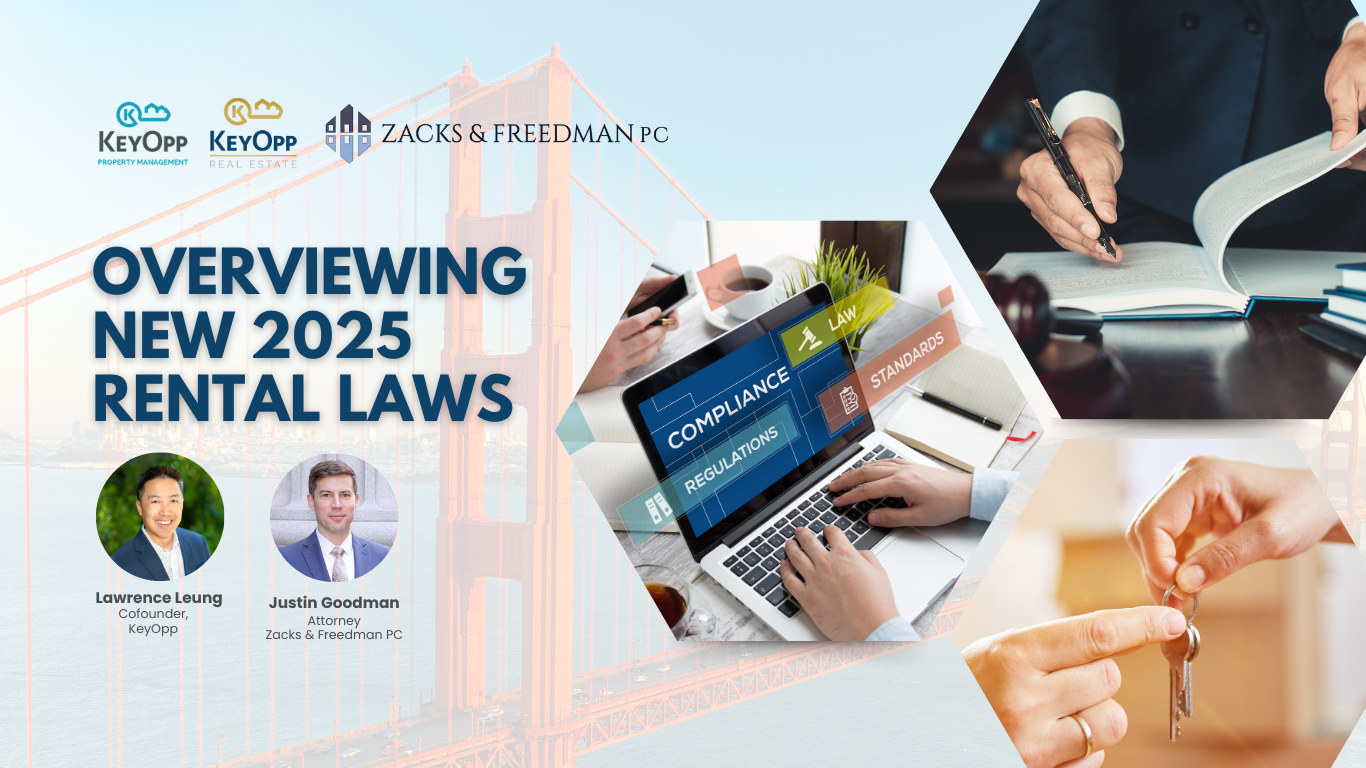
Below is an in-depth look at the most significant new laws, plus best practices to help you navigate your obligations as a landlord in San Francisco.
1. The End of the Ten-Day ‘Pre-Notice’ in San Francisco
For a brief period, San Francisco attempted to mandate that landlords issue an extra ten-day notice before serving any type of Three-Day Notice to Pay Rent or Quit or a Three-Day Notice to Cure or Quit. This extra step effectively prolonged the timeline for nonpayment and lease-violation evictions. As Justin Goodman explained:
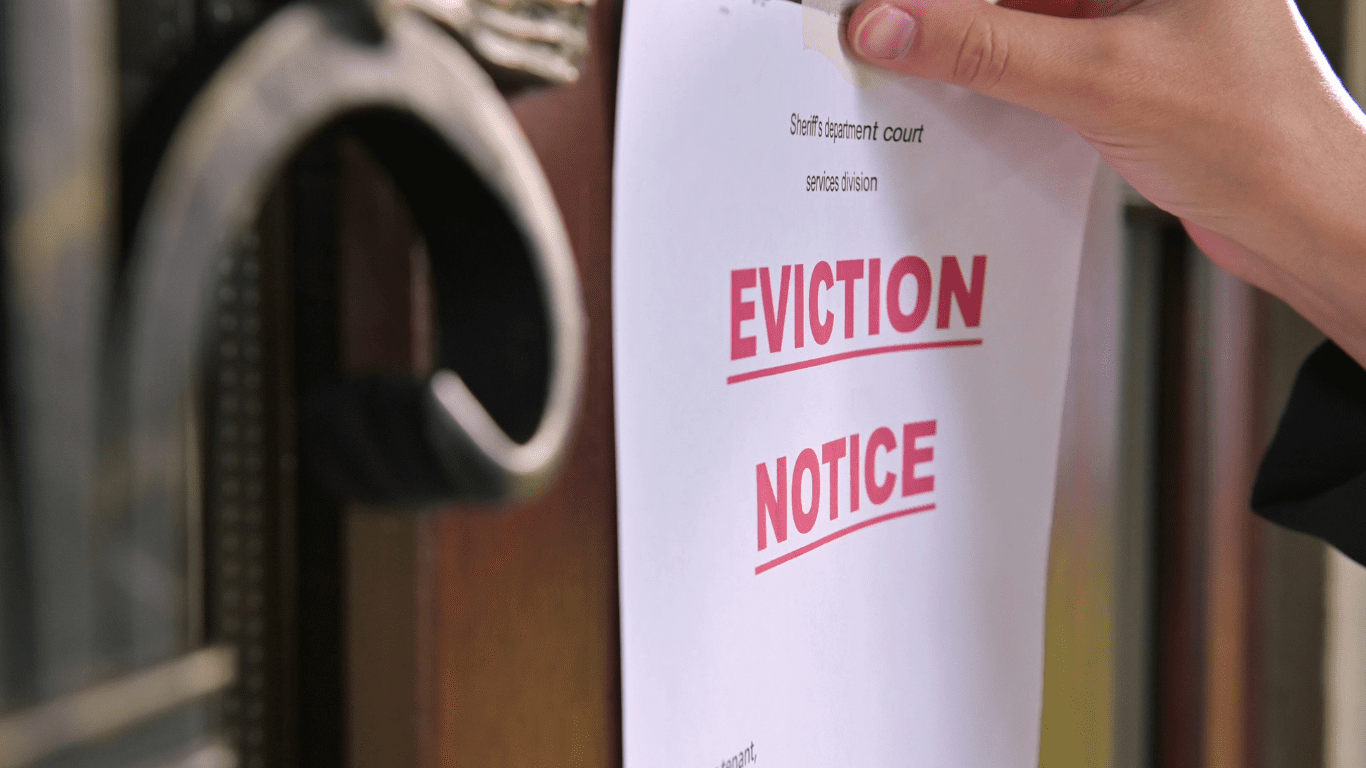
“San Francisco… tried to set a local regulation in front of the state’s procedural rules. They wanted a ten-day notice to cure. That added more delay for the landlord before the three-day notice. But state law is clear: local jurisdictions can regulate why a landlord may evict, but not how an eviction lawsuit proceeds.”
Ultimately, this local requirement was overturned by the courts, thanks to the efforts of Justin’s law firm, Zack & Freedman PC. Today, landlords are back to using the “evergreen rules” they know best: a Three-Day Notice to Pay or Quit (or Cure or Quit) as mandated under state law. The local ten-day notice is no longer in effect.
Best Practice
Continue using the standard Three-Day Notice procedures. Verify that you are fully compliant with state law (including accurate notice wording and proper service) and disregard the once-mandated ten-day notice requirement. Though, in the case of many fault-based evictions, it may still be prudent to develop a paper trail with the tenant, providing an opportunity to follow the rules before you enforce your rights by pursuing an eviction.
2. Preserving Vacancy Decontrol: Propositions 33 and 34

A major concern for many California landlords has always been the future of Costa Hawkins, a state law that keeps single-family homes and newly constructed units exempt from local rent control—and preserves the right to reset rents to market whenever a tenant voluntarily vacates or is evicted for a fault-based reason. In 2024’s November election:
- Proposition 33 threatened to repeal Costa Hawkins and establish the primacy of local governments to enact any form of rent control, including the most severe type, known as “strict” or “vacancy control.”
- Proposition 34 prevented property owners with certain outstanding violations from placing measures on local ballots, widely interpreted as a direct response to the sponsor of Prop 33.
Voters ultimately rejected Proposition 33, keeping Costa Hawkins intact. As Justin described:
“If Prop 33 had passed, it wouldn’t just repeal Costa Hawkins—it would assert local authority over rent control in a way that couldn’t be undone legislatively. Fortunately, voters saw that it would do more harm than good for small property owners.”
For now, Costa Hawkins remains the law of the land. Single-family homes and new construction (with certificates of occupancy issued on or after June 13, 1979 in San Francisco) remain exempt from local rent control, unless they fall under separate state limitations like AB 1482.
Best Practice
Stay vigilant about potential future changes. Even though Costa Hawkins was preserved for now, repeated attempts to undermine or repeal it can recur. Align yourself with a local landlord association (e.g., the San Francisco Apartment Association) and follow updates closely.
3. Security Deposits: Big Changes Under AB 12 and 2025 Updates
Security deposits have always been a hot-button issue in California. Beginning July 1, 2024, AB 12 capped the amount of deposit a landlord can collect at one month’s rent for most new, unfurnished tenancies. (Historically, California law allowed landlords to collect up to two months for unfurnished units and three months for furnished units.)
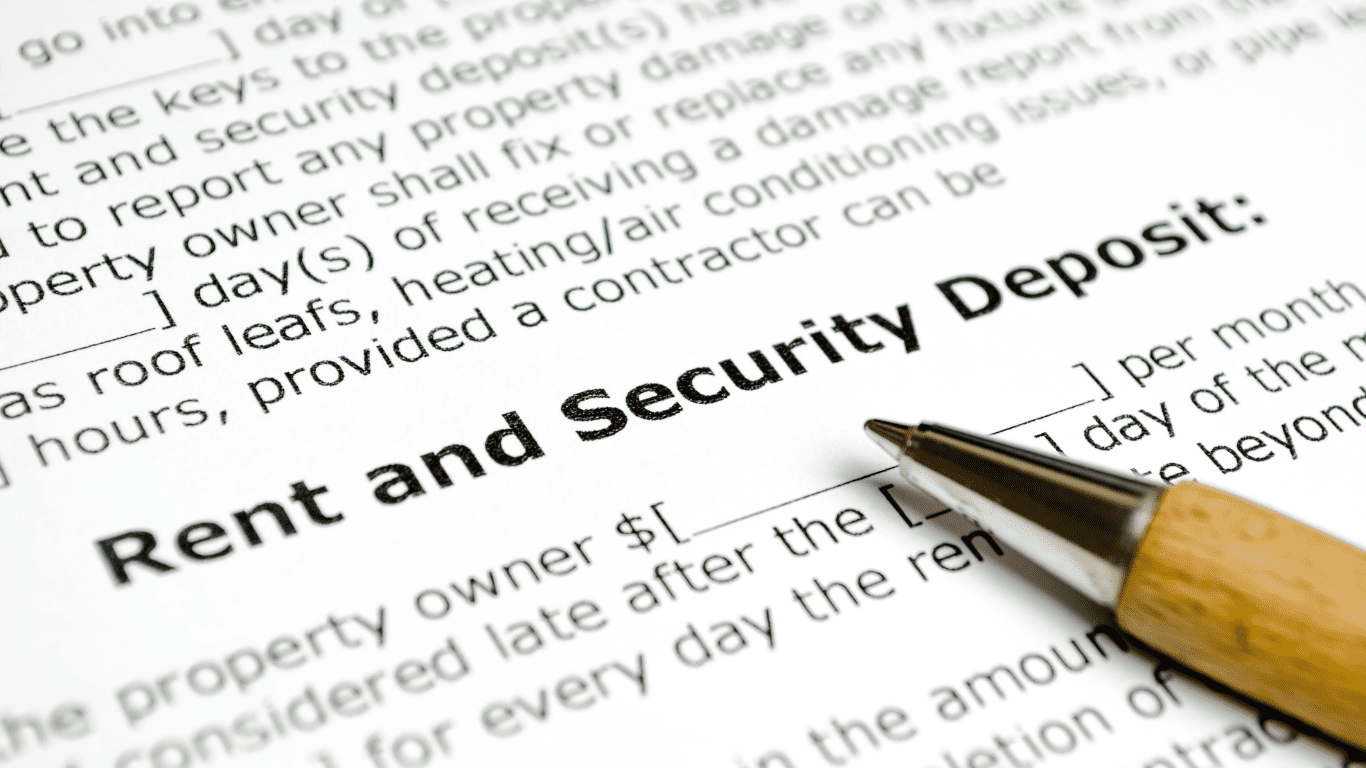
While a small “mom-and-pop” exemption still exists—allowing owners of up to two properties with four or fewer total units, and who are natural persons rather than an LLC or trust, to potentially collect two months’ deposit—most landlords are now capped at a single month. Lawrence Leung clarified how KeyOpp has adapted:
“We used to maximize the deposit at two months for unfurnished. Now, under the new law, for new tenancies starting after July 1, 2024, we can only take one month, unless we qualify for the very narrow small landlord exemption.”
New Requirements: Documenting Damage
State law also introduced a three-tiered photo requirement for new leases effective in 2025:
- Before: Take “move-in” photographs or a detailed video showing the unit’s condition prior to tenant occupancy.
- After: Upon move-out, document any damage beyond normal wear and tear.
- Proof of Repair: Provide evidence (photographs, invoices) that the landlord actually remedied the damage in order to deduct from the deposit.
Landlords lacking “before” photos from older, ongoing tenancies should still follow best practices for move-out photos and repairs. However, the new rule is forward-looking and applies chiefly to tenancies starting on or after April 1, 2025 (or check your local effective date).
Normal Wear and Tear vs. Damage
One of the most common misunderstandings is trying to charge for what law deems normal wear and tear. As Justin Goodman explained:
“You can’t charge for the gradual deterioration of paint or the tread on a carpet from everyday use. A fist hole in the wall? Absolutely charge. Scuffed paint from normal living? Not so much.”
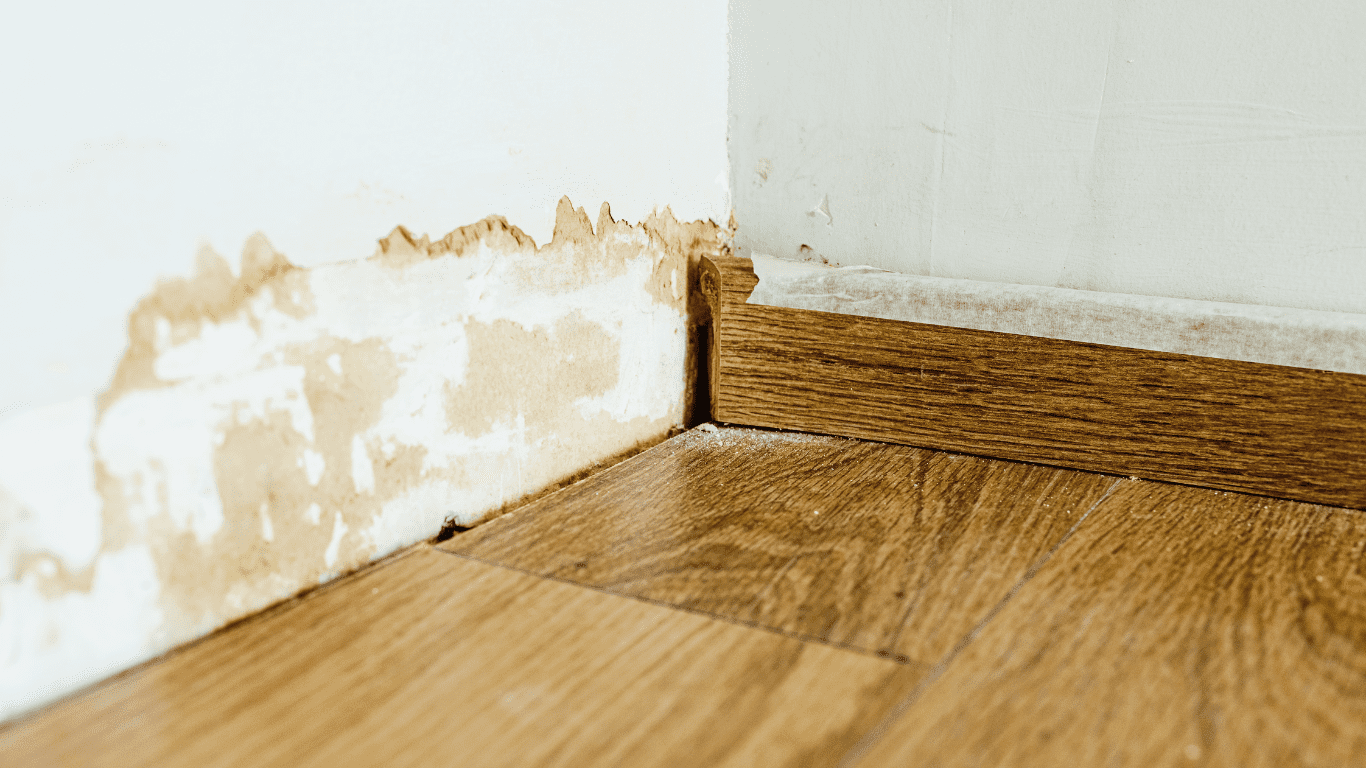
Overstepping deposit deductions can lead to small claims disputes or, worse, larger wrongful-eviction style lawsuits. Judges may deny any claim to the deposit if the landlord failed to follow disclosure procedures.
Best Practices for Security Deposits
- Collect no more than one month’s rent unless you qualify for the small-landlord exemption.
- Adopt thorough documentation: pre-move-in checklists, detailed photos, and after-move-out inspection photos.
- Provide a pre-move-out inspection option as required by law, giving tenants a chance to correct issues before final move-out.
- Return or account for deposits within 21 days, providing an itemized list of deductions and copies of repair invoices.
- Pay annual interest on deposits in San Francisco (the rate changes each year; see the SF Rent Board’s website).
4. Tenant Screening and Application Fees: AB 2493
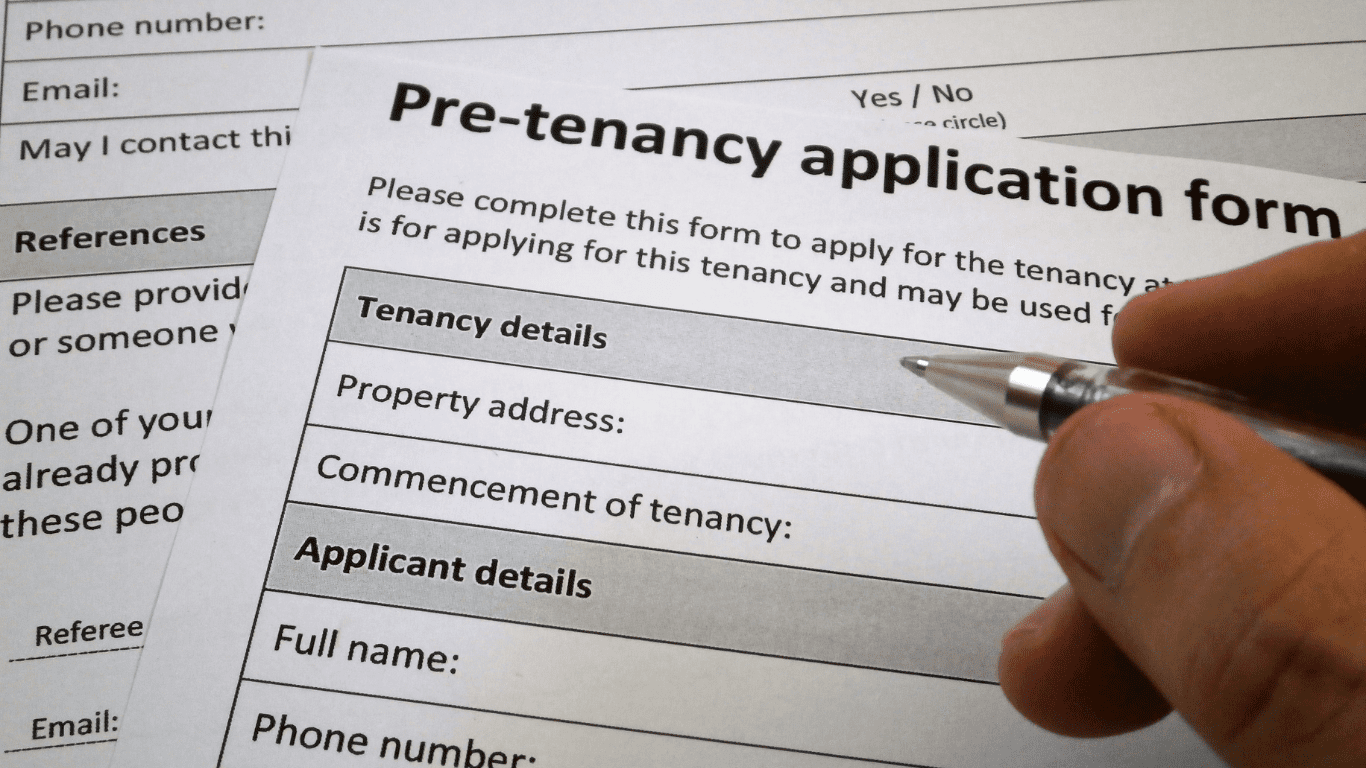
Another key change for 2025 is AB 2493, which addresses how landlords can lawfully charge application fees. If you want to offset the costs of credit checks and screening reports, you must choose one of two published procedures:
- First Qualified, First Approved
- You can collect an application fee from each applicant in chronological order. Once the first qualified applicant is approved, you stop charging fees to anyone else. You must refund any fees collected from subsequent applicants who did not even get considered.
- Collect from Everyone, Then Refund Non-Selected
- You may charge each applicant a screening fee, but you must fully refund the fee to any applicant you do not approve.
Importantly, you also need to keep published screening criteria—such as income requirements, eviction history, and credit score thresholds. However, be mindful of recent expansions in source-of-income protections (e.g., Section 8, VASH, or nonprofit subsidies). You cannot automatically disqualify an applicant for having a housing voucher. You can still maintain neutral criteria, but must allow voucher holders to submit alternative documentation if their credit history falls short.
Best Practice
- Decide on which tenant-screening path you prefer and document it clearly.
- Use neutral, objective criteria to avoid fair housing violations.
- Do not exclude tenants based on receiving subsidies like Section 8—this is illegal discrimination against a protected source of income.
- Also consider not collecting any application fee, in which case this new law does not apply.
5. Expanded Domestic Violence Protections: SB 1051

California law has long recognized that victims of domestic violence have the right to break a lease with short notice to escape a dangerous environment. SB 1051 in 2025 further clarified and expanded these rights. If a tenant provides documented evidence (e.g., a restraining order or police report), they can:
- Give 14 days’ notice to vacate (instead of the usual 30-day requirement or the obligation to remain for the duration of the lease term).
- Request you change the locks at the landlord’s expense. If the landlord is not prompt, the tenant may change them and bill the landlord.
- Avoid further rent liability beyond those 14 days, although you as the landlord must try to mitigate damages by re-renting the unit quickly.
Domestic violence often arises between co-tenants, creating complex situations in which one occupant wants off the lease, while the other may remain. Justin Goodman pointed out that landlords could, in theory, file a nuisance eviction for the “dominant aggressor.” However, it is often prudent to work with the victim, releasing them from their lease obligations once they have given proper notice and documentation.
Best Practice
- Familiarize yourself with the domestic violence lease-break statutes.
- If you are served notice and evidence of domestic violence, respond swiftly and compassionately.
- Document all communication to show you complied with these heightened protections.
6. Balconies and Exterior Inspection Requirements: AB 2579
A tragic balcony collapse in Berkeley years ago led to major changes in how California jurisdictions require regular inspections of balconies, decks, and exterior stairs. In San Francisco, these have long been governed by the “604 Inspection” rule, which requires owners of three-unit (or larger) buildings to have a licensed professional (architect, structural engineer, or qualified contractor) inspect exterior egresses and appendages every five years.

AB 2579 effectively expands these kinds of requirements statewide. Although smaller two-unit properties may be exempt from San Francisco’s local code, a prudent landlord should still maintain a regular inspection schedule:
- Ensure wooden balconies, decks, and stairs are free of dry rot and structural instability.
- Submit required paperwork or affidavits on schedule to the Department of Building Inspection (DBI), if applicable.
Best Practice
Treat these inspections as vital preventive measures. “Pay now or pay later” holds especially true for structural integrity. Failing to comply can expose you to huge liability if an accident occurs.
7. Eviction Process Updates: AB 2347 and the Extended Summons

California’s unlawful detainer (eviction) process has historically moved faster than ordinary civil litigation, with a shortened response window for tenants (e.g., five days to answer). However, that window has evolved:
- It is now essentially 10 court days for a tenant to respond, and weekends/judicial holidays do not count.
- Landlords often face delays with “dodging service,” where tenants actively avoid being served. You may need a court order to post-and-mail notices, adding more time.
- Even straightforward nonpayment of rent cases can take two to four months or more once you factor in discovery, trial setting, and any possible stays of eviction granted by the court.
Justin Goodman underscores this reality:
“We’re seeing it take around two months, sometimes more, just to get a trial date. Tenants can file demurrers or other motions, and each adds time. By the time the sheriff is involved for a lockout, it’s easily several months, even for a simple nonpayment case.”
Best Practice
- Manage your expectations. Evictions are rarely quick in San Francisco.
- Serve impeccably drafted and properly executed notices—any small defect restarts the clock.
- Consider professional property management and legal counsel to ensure strict compliance, reducing the risk of a judge throwing out your case on technical grounds.
Additional Tips: Rent Increases & Local Memberships

Rent Increase Limitations
California’s AB 1482 caps annual rent increases to 5% + local CPI, or 10%, whichever is lower, for many properties (unless exempt). Meanwhile, rent-gouging statutes kick in during states of emergency declared by the governor (e.g., wildfires, storms), making it risky to attempt rent hikes above 10%. A safer practice is to stay below 10% to avoid triggering extended notice requirements or inadvertently violating price-gouging laws if an emergency is declared mid-notice.
Join the San Francisco Apartment Association (SFAA)
One of the most frequently repeated pieces of advice in the webinar was to join a local landlord association like the San Francisco Apartment Association. They offer:
- Monthly legal panels and updates on new legislation.
- A comprehensive lease agreement updated annually to reflect the latest city and state rules.
- Resource guides for security deposit interest rates, rent board fees, and other local obligations.
“We would not be an effective property management company if we didn’t have the SF Apartment Association,” Lawrence emphasized. “Every single year, they update their lease agreement to include all the changes at the state and local level.”
Conclusion: Proactive Compliance, Reduced Liability
Amid an ever-shifting legal environment, landlords in San Francisco must be especially vigilant. The expansions in domestic violence protections, the changes to security deposit laws, and the evolving rules for tenant screening each come with new procedures that landlords must follow precisely. Even small mistakes—like failing to provide itemized deposit deductions or inadvertently violating source-of-income protections—can escalate into expensive disputes.
Key Takeaways
- Three-Day Notices are back to normal in San Francisco: no more ten-day pre-notice.
- Costa Hawkins remains intact (for now), ensuring vacancy decontrol, thanks to voters rejecting Prop 33.
- Security Deposits are capped at one month’s rent for new tenancies, and you must meticulously document damage with photographs.
- Tenant Screening Fees require published criteria and either a “first qualified, first approved” approach or full refund to non-selected applicants.
- Domestic Violence protections allow tenants in crisis to break leases on short notice, often with lock-change requests.
- Inspections of balconies and decks under AB 2579 are increasingly emphasized statewide, mirroring San Francisco’s “604” rule.
- Evictions still require strict compliance and can take months; always involve legal counsel.
- Rent Increases beyond 10% are legally complex; keep them below 10% to stay on the safe side.
- Join SFAA or a similar group for ongoing legal updates and best-practice guidance.
By embracing these requirements—and working closely with an experienced landlord-tenant attorney—you can navigate San Francisco’s regulatory environment far more effectively. As Justin Goodman points out, the goal is often to avoid litigation altogether:
“If we’re all doing our job correctly—attorneys, landlords, property managers—hopefully nothing erupts into litigation. And that’s part of what today is about: making sure you know the law, where the minefields are, and how to stay safe.”
Ultimately, proactive compliance not only spares you from frustration and legal fees but also fosters more stable tenancies, helps you maintain the value of your property, and upholds your standing as a responsible housing provider in San Francisco’s challenging but rewarding market.
Contact the Experts
For Legal Advice
If you’re facing a complex eviction case, have questions about security deposits, or want guidance on any landlord-tenant legal matters, Justin Goodman at Zack & Freedman PC is here to help. You can reach Justin’s office at:
- Phone: (415) 956-8100
- Website: https://www.zfplaw.com/attorney/justin-a-goodman/
Costa-Hawkins.com
(Note: Any communication with an attorney requires a conflict-of-interest check before legal advice can be provided. Justin’s firm will guide you through that process.)
For Property Management Advice
If you need reliable property management services, help navigating rent increases, or general landlord guidance in San Francisco, Lawrence Leung at KeyOpp Real Estate offers comprehensive expertise:
- Phone: (415) 307-3787
- Email: lawrence@keyopp.net
- Website: www.keyopp.net
Feel free to reach out with any questions about your rental property, leasing strategies, or ways to minimize risk in the San Francisco market.
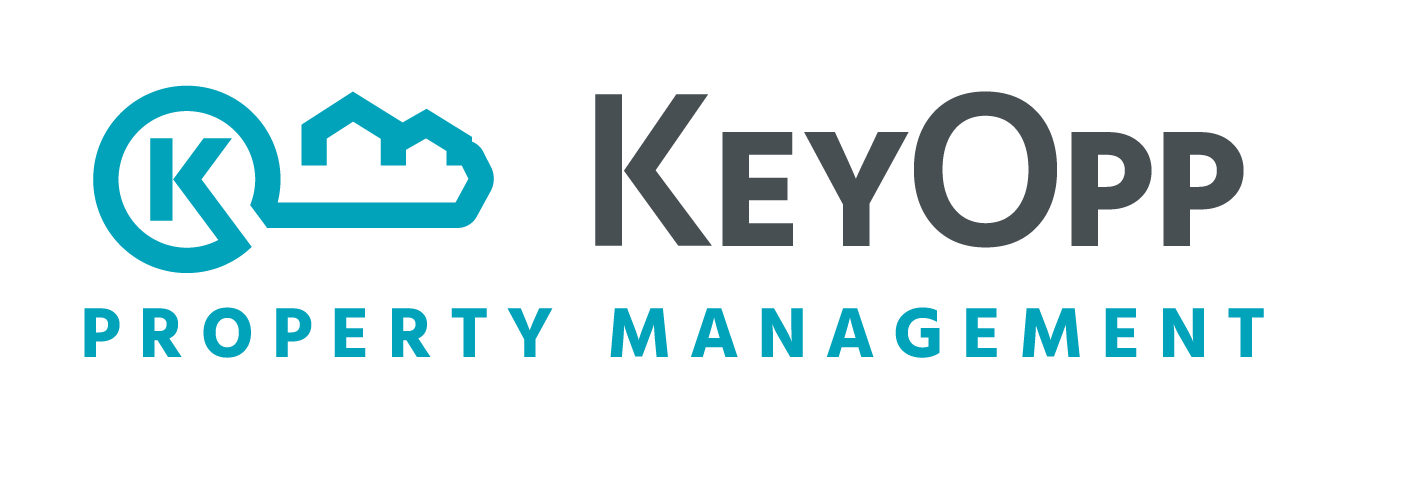
 With over 30 years of real estate experience, Lawrence brings a family-focused approach to Real Estate. Starting early on by assisting his father with hands-on repairs and maintenance with various properties and later assisting with the backend operational processes, Lawrence along with his wife Melanie Leung have a developed multiple businesses focusing on all aspect of Real Estate including, but not limited to, Property Management, Investment Strategies as well as Buyer and Seller Representation. By working in multiple aspects of the real estate process, he brings a multi-faceted perspective to the buying and investment process. As a duo team with a strong knowledge of property investment, Lawrence is able to provide all the necessities an investor needs to make the smart choices.
With over 30 years of real estate experience, Lawrence brings a family-focused approach to Real Estate. Starting early on by assisting his father with hands-on repairs and maintenance with various properties and later assisting with the backend operational processes, Lawrence along with his wife Melanie Leung have a developed multiple businesses focusing on all aspect of Real Estate including, but not limited to, Property Management, Investment Strategies as well as Buyer and Seller Representation. By working in multiple aspects of the real estate process, he brings a multi-faceted perspective to the buying and investment process. As a duo team with a strong knowledge of property investment, Lawrence is able to provide all the necessities an investor needs to make the smart choices. Having grown up with parents working in real estate, I found my passion for this industry at an early age. I chose to follow in their footsteps after seeing how many clients they were able to help fulfill the American Dream of Home Ownership. After 7 years of working extensively in the San Francisco Bay Area, I have developed a keen understanding of the local market and always take the time to figure out what clients really need from me as a professional real estate broker. I take pride in serving my clients with the utmost level of care and professionalism. It is my job to ensure a smooth, worry-free, and satisfying experience for everyone involved.
Having grown up with parents working in real estate, I found my passion for this industry at an early age. I chose to follow in their footsteps after seeing how many clients they were able to help fulfill the American Dream of Home Ownership. After 7 years of working extensively in the San Francisco Bay Area, I have developed a keen understanding of the local market and always take the time to figure out what clients really need from me as a professional real estate broker. I take pride in serving my clients with the utmost level of care and professionalism. It is my job to ensure a smooth, worry-free, and satisfying experience for everyone involved.

 Nathalie began her professional career in software and data management. Working with imperative government statistics, Nathalie developed a strong attention to detail and exceptional multitasking capabilities. As a technical support specialist in the IT industry, Nathalie began to deepen her desire to help people and provide excellent customer service. Driven by a mission to be user-centric and customer-focused, she approaches all customer interactions with sincerity and an eagerness for improvement. She’s your go-to person when you’re stuck, need help, or just need someone to listen.
Nathalie began her professional career in software and data management. Working with imperative government statistics, Nathalie developed a strong attention to detail and exceptional multitasking capabilities. As a technical support specialist in the IT industry, Nathalie began to deepen her desire to help people and provide excellent customer service. Driven by a mission to be user-centric and customer-focused, she approaches all customer interactions with sincerity and an eagerness for improvement. She’s your go-to person when you’re stuck, need help, or just need someone to listen. Erika May Roslin has a BA in Accounting and has professional experience working in finance and administration. She has a robust appreciation for accuracy and precision which makes her well equipped for bookkeeping within the real estate and property management industries. Erika has also developed excellent customer service skills and highly values customer satisfaction. She strives to make customers and clients feel happy with their products and services and seeks feedback to further improve operations.
Erika May Roslin has a BA in Accounting and has professional experience working in finance and administration. She has a robust appreciation for accuracy and precision which makes her well equipped for bookkeeping within the real estate and property management industries. Erika has also developed excellent customer service skills and highly values customer satisfaction. She strives to make customers and clients feel happy with their products and services and seeks feedback to further improve operations. Cherrylane has developed excellent customer service and conflict diffusion skills during her 20 years in the gaming and casino industry. Patience, honesty, and professionalism are at the heart of her commitments and honors her work with integrity and confidentiality. As Cherrylane pivots into the BPO (Business Process Outsourcing) industry, her advanced customer service experience is extremely useful in ensuring customer satisfaction and support. She has worked and interacted with people from diverse cultures and from all walks of life, making her personable and empathetic. We’re thrilled to have her as part of our operations team.
Cherrylane has developed excellent customer service and conflict diffusion skills during her 20 years in the gaming and casino industry. Patience, honesty, and professionalism are at the heart of her commitments and honors her work with integrity and confidentiality. As Cherrylane pivots into the BPO (Business Process Outsourcing) industry, her advanced customer service experience is extremely useful in ensuring customer satisfaction and support. She has worked and interacted with people from diverse cultures and from all walks of life, making her personable and empathetic. We’re thrilled to have her as part of our operations team. Emily is originally from Los Angeles, California, and graduated from Chapman University with a degree in Business Communication. Her first experience in a leadership role was as a department manager at Nordstrom. It was here she developed her skills in people management as well as client retention. She was awarded with a “Customer Service All-Star” award by the CEO for her creative problem-solving skills and stellar success in giving customers the utmost best service. Following this chapter, she moved her expertise into a Project Management role at an Architectural Engineering company in Southern California. It was here she found her passion for home design and ultimately real estate. With Emily’s combined people skills and passion for the business of real estate and property management, she is thrilled to help grow all facets of KeyOpp.
Emily is originally from Los Angeles, California, and graduated from Chapman University with a degree in Business Communication. Her first experience in a leadership role was as a department manager at Nordstrom. It was here she developed her skills in people management as well as client retention. She was awarded with a “Customer Service All-Star” award by the CEO for her creative problem-solving skills and stellar success in giving customers the utmost best service. Following this chapter, she moved her expertise into a Project Management role at an Architectural Engineering company in Southern California. It was here she found her passion for home design and ultimately real estate. With Emily’s combined people skills and passion for the business of real estate and property management, she is thrilled to help grow all facets of KeyOpp. Katrina embarked on her professional journey as a Digital Marketing Specialist in Real Estate right after graduating in 2019 with a Bachelor of Arts in Business Administration, majoring in Marketing Management.
Katrina embarked on her professional journey as a Digital Marketing Specialist in Real Estate right after graduating in 2019 with a Bachelor of Arts in Business Administration, majoring in Marketing Management.
 Kristine Cordenillo’s fascination with the concept of home got her into the property management industry. She believes the home is a significant factor in shaping a person’s identity. She was previously a Lease Management Manager for a property management company based in Michigan for about five years. She is currently a candidate for a degree in Masters in Anthropology.
Kristine Cordenillo’s fascination with the concept of home got her into the property management industry. She believes the home is a significant factor in shaping a person’s identity. She was previously a Lease Management Manager for a property management company based in Michigan for about five years. She is currently a candidate for a degree in Masters in Anthropology. Calvin Yu is a seasoned professional with a decade of diverse experience, underpinned by a foundation in Business Administration from San Francisco State University. His career trajectory includes roles in food service, project management, and as a production associate at Tesla, each contributing to his robust skill set. In these roles, Calvin has demonstrated his ability to thrive in fast-paced environments, showcasing his hardworking nature, diligence, and patience. His time in the food service industry refined his customer service and operational skills, while his project management experience enhanced his strategic planning and problem-solving capabilities. At Tesla, he embraced the challenge of precision and innovation, further solidifying his adaptability and commitment to excellence.
Calvin Yu is a seasoned professional with a decade of diverse experience, underpinned by a foundation in Business Administration from San Francisco State University. His career trajectory includes roles in food service, project management, and as a production associate at Tesla, each contributing to his robust skill set. In these roles, Calvin has demonstrated his ability to thrive in fast-paced environments, showcasing his hardworking nature, diligence, and patience. His time in the food service industry refined his customer service and operational skills, while his project management experience enhanced his strategic planning and problem-solving capabilities. At Tesla, he embraced the challenge of precision and innovation, further solidifying his adaptability and commitment to excellence. Anupama’s journey began with a deep curiosity for design, leading her to complete a 3-year diploma in Design and Animation. However, her passion for Marketing and Real Estate soon took center stage. With 10 years of experience, she has helped brands scale and thrive by crafting strategic, data-driven solutions and building a strong digital presence.
Anupama’s journey began with a deep curiosity for design, leading her to complete a 3-year diploma in Design and Animation. However, her passion for Marketing and Real Estate soon took center stage. With 10 years of experience, she has helped brands scale and thrive by crafting strategic, data-driven solutions and building a strong digital presence.